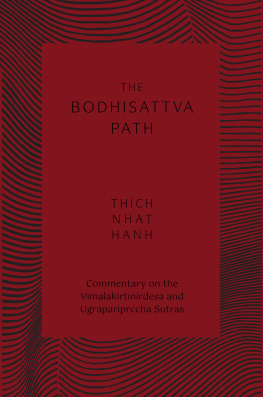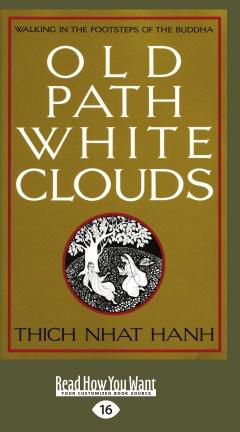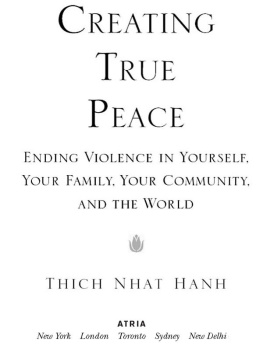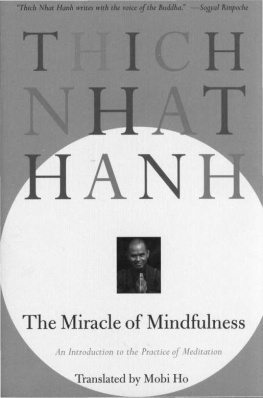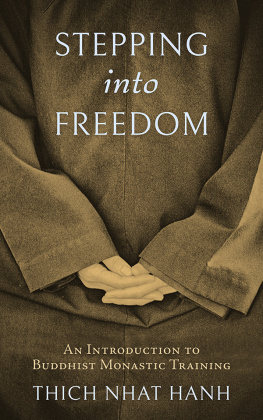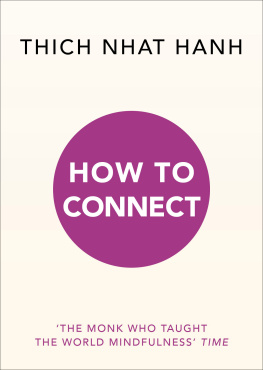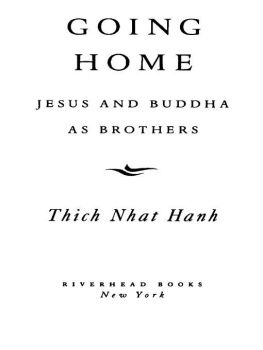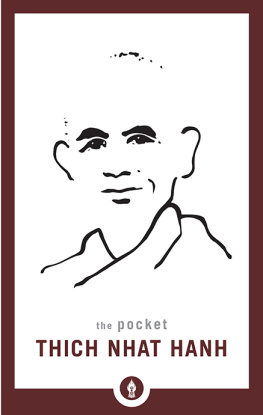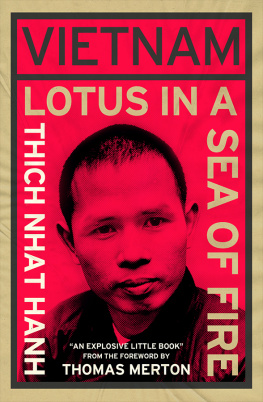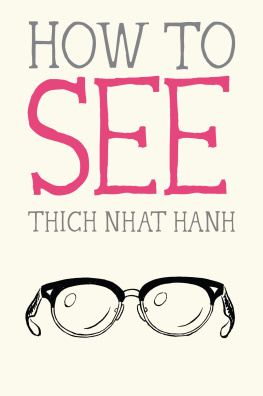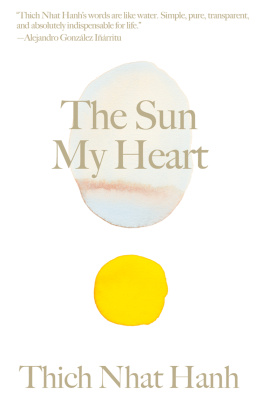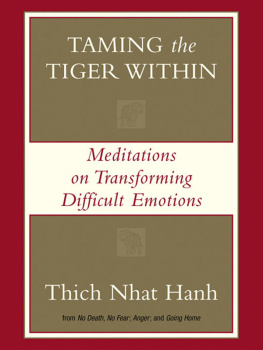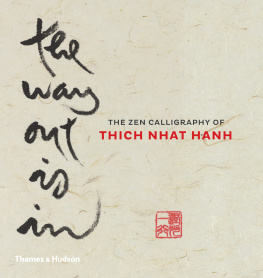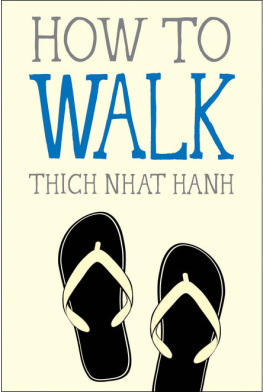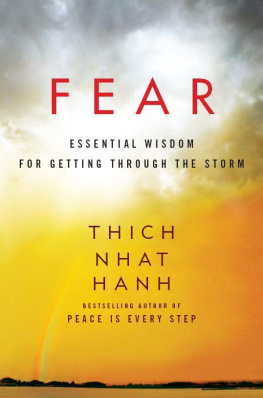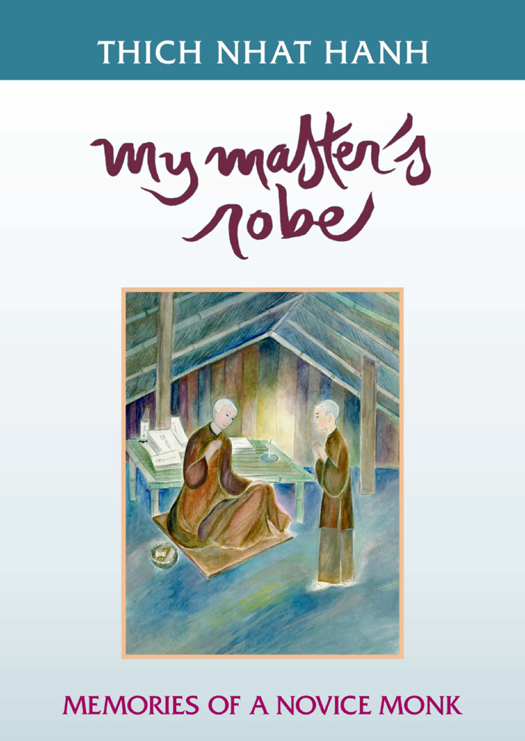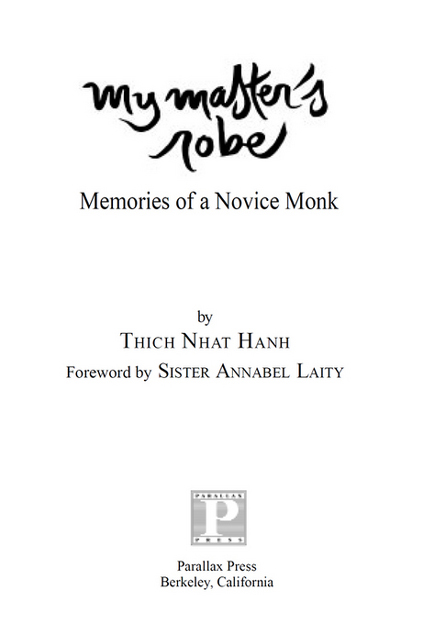Other Books by Thich Nhat Hanh
Be Still and Know:
Reflections from Living Buddha, Living Christ
Being Peace
The Blooming of a Lotus:
Guided Meditation Exercises for Healing and Transformation
Breathe! You Are Alive: Sutra on the Full Awareness of Breathing
Call Me by My True Names: The Collected Poems of Thich Nhat Hanh
Cultivating the Mind of Love:
The Practice of Looking Deeply in the Mahayana Buddhist Tradition
The Diamond That Cuts through Illusion:
Commentaries on the Prajaparamita Diamond Sutra
For a Future to Be Possible:
Commentaries on the Five Mindfulness Trainings
Fragrant Palm Leaves: Journals 1962-1966
The Heart of Understanding:
Commentaries on the Prajaparamita Heart Sutra
Hermitage among the Clouds:
An Historical Novel of Fourteenth Century Vietnam
Interbeing: Fourteen Guidelines for Engaged Buddhism
A Joyful Path: Community, Transformation and Peace
The Long Road Turns to Joy: A Guide to Walking Meditation
The Miracle of Mindfulness: A Manual on Meditation
Old Path White Clouds: Walking in the Footsteps of the Buddha
Our Appointment with Life:
Discourse on Living Happily in the Present Moment
Plum Village Chanting and Recitation Book
Present Moment Wonderful Moment: Mindfulness Verses for Daily Living
Stepping into Freedom: An Introduction to Buddhist Monastic Training
The Stone Boy and Other Stories
Sutra on the Eight Realizations of the Great Beings
A Taste of Earth and Other Legends of Vietnam
Thundering Silence: Sutra on Knowing the Better Way to Catch a Snake
Transformation and Healing:
Sutra on the Four Establishments of Mindfulness
Parallax Press
P.O. Box 7355
Berkeley, California 94707
www.parallax.org
Parallax Press is the publishing division of Unified Buddhist Church, Inc.
2002, by Unified Buddhist Church.
All Rights Reserved.
Cover design and illustrations by Nguyen Thi Hop and Nguyen Dong.
Special thanks to the sisters at Green Mountain Dharma Center and the volunteers of La Boi Press for translating the stories from the Vietnamese language.
Library of Congress Cataloging-in-Publication Data
Nht Hanh, Thch.
[Tinh Nguoi: English]
My Masters Robe / by Thich Nhat Hanh.
p. cm.
Translation of Tinh Nguoi.
ISBN 1-888375-03-5 (pbk.)
Ebook ISBN: 978-1-935209-10-2
1. Nht Hanh, Thch. 2. Buddhist novicesVietnamBiography. 3. Monastic and religious life (Buddhism)Vietnam. 4. Priests, BuddhistVietnamBiography. I. Title.
BQ962.H36 A3 2002
294.3657092dc21
2002002678
v3.1
C ONTENTS
F OREWORD
W ritten by the author in his late twenties, these stories first appeared in Phat Giao Buddhist Magazine between 1956 and 1959. The stories were collected in a book titled Tinh Nguoi (Vietnamese) and published in 1964 by La Boi Press, Saigon. Tinh nguoi means humanity and the stories are about just that humanity in the midst of war and violence.
This subject is pertinent to us in our own time. In the face of terrorism, what lessons can we learn from the different spiritual paths of the world? Terrorism could break out anywhere at anytime; it is always available even if dormant. When given the right causes and conditions, the seeds of terrorism sprout and we have to deal with a living hell. Whether perpetrated unofficially by a relatively small group of individuals or by a large army sanctioned by the state, terrorism can only be responded to by human love. Human love is also always available, and we can recognize that we are one humanity that all mothers everywhere suffer when their sons are killed in war.
My Masters Robe is set in the heart of a peaceful monastery that is surrounded by war during the years from 19421947. The French fought a bitter war to maintain their sovereignty in Vietnam from 19461954. The people of Vietnam were terrorized by the colonialists, and no doubt the French soldiers suffered bitterly at the hands of the Viet Minh. It was at a time when in France the aftermath of the Second World War was still lingering heavily. This is what is meant by the sentence spoken by the young French soldier in : Seeing the people here work so hard to rebuild their shattered lives reminds me of the shattered lives of my relatives in France.
The author describes his encounter with this young French soldier in 1947. He himself was still young, a fully-ordained Buddhist monk of twenty-one years-old or so. The author says outright in this chapter that at the time he did not like French soldiers very much. French soldiers had raided the monasteries for food and had executed monks belonging to the resistance movement, sometimes in very cruel ways. The monks of the authors monastery had been forced to evacuate for several months. In spite of this, he embraced the young French soldier he met as a true friend and a brother.
In 194647, young monks and nuns wanted to save their country from foreign domination. Institutes of Buddhist Studies were closed so that the student monks and nuns could devote more time to demonstrations and meetings supporting the national movement for independence. At the same time, the Buddhist monastery provided a nectar of compassion for the Vietnamese people during these years. The peaceful life of the monastery, where true brotherhood was possible, was a small oasis in the midst of the suffering of war. To say that it was a small oasis refers only to the space that the monastery occupied. In terms of the far-reaching effect of the monastic practice at that time and the implications it would have in the future, the oasis could be conceived of as very great.
Fifty-five years after the events recounted in this book, the author continues to live and shape the monastic life to reflect the good in the world. He has not shirked his responsibility for one moment. After the terrorist attacks in New York on September 11, 2001, he called for a ten-day fast and led ceremonies for those who died or were injured. He visited New York to help people deal with their fear and anger and to support those who cared for the victims of the tragedy and the bereaved. His message was basically the same as we find in the conversations he had in the 1940s with his monk brother, Tam Man, and the young French soldier in this book.
In some of the conversations between the author and Brother Tam Man there are references to the Ly and Tran eras. The Ly and Tran eras lasted from the tenth to the end of the fourteenth century in Dai Viet, the country that was the precursor of modern Vietnam. The Tran kings, and the Ly kings before them, were Buddhists. Under their rule, the country of Dai Viet, just freed from Chinese rule, enjoyed a period of peace, prosperity, and independence. These eras were an inspiration to the author of this book and his contemporaries in the movement seeking independence from colonial rule in the twentieth century, and they are an inspiration to practicing Buddhists in our own time.


